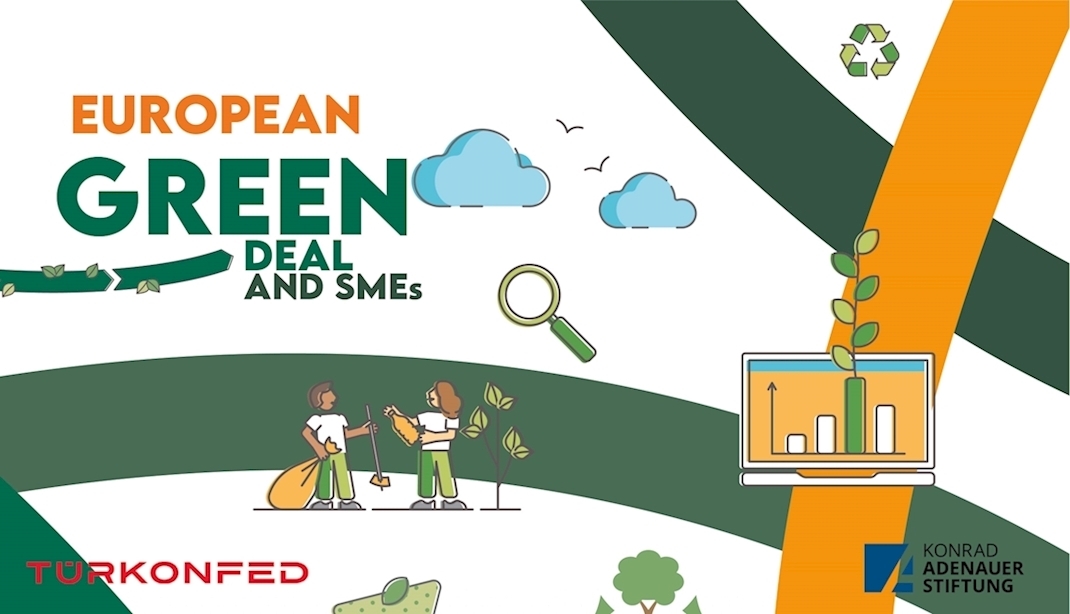Turkish Enterprise and Business Confederation (TÜRKONFED) has published a report titled “European Green Deal and SMEs” to evaluate in terms of SMEs the change that started with the European Green Deal (EGD). The report states that the European Union is Turkey’s largest export market and import provider, and that SMEs, which have a significant share in the economy, will play a key role in this change, and therefore, the EGD is not an obstacle but an opportunity.
European Green Deal Is Not An Obstacle But An Opportunity For SMEs

Published by the European Commission two years ago in order to make Europe climate neutral by 2050 and to ensure the sustainability of the EU economy, the European Green Deal (EGD) is of great interest to the business world. The adaptation of enterprises to this transformation is of great importance, especially due to the Carbon Border Adjustment Mechanism (CBAM) planned to be implemented in 2023 at the latest.
Turkish Enterprise and Business Confederation (TÜRKONFED) has published a report titled “European Green Deal and SMEs” to evaluate this change process in terms of SMEs. The report prepared by TÜRKONFED Economic Advisor Assoc. Prof. Dr. Nazlı Karamollaoğlu evaluated the roles of SMEs, the obstacles and opportunities they face in terms of green growth, and also calculated the potential effects of CBAM on SMEs. TÜRKONFED’s report also evaluated the areas of resource efficiency and digitalization of SMEs from the perspective of policies to be implemented within the scope of the EGD and included comparisons between Turkey and other OECD countries.
SMEs will play a key role in the EGD process
Stating that Turkey is the European Union’s largest export market and import provider, the Report noted that the SMEs constituting 50.4 percent of the total turnover, 72.4 percent of employment and 37 percent of the total exports will have a key role in this transformation. Emphasizing that the EGD is not an obstacle but an opportunity if the process is complied with, the report explained the importance of businesses’ being aware of the policies to be implemented within the scope of the EGD.
Carbon Border Adjustment Mechanism will indirectly affect SMEs
The Report also includes the impacts of the CBAM aiming to reduce the risk of carbon leakage resulting from shifting EU production to countries with looser climate standards, especially in the Energy Intensive Trade Open (EITO) sectors. Accordingly, taxes to be exposed with the CBAM will be an important cost element in the upcoming period, especially for large-scale companies.
Since the share of exports in their total sales is less than that of large companies, SMEs will be initially affected limitedly by the cost elements created by CBAM. However, SMEs, which are the most important part of the supply chain, will face the risk of being excluded from the supply chain of large companies if they do not make the regulations within the scope of CBAM. For this reason, SMEs that cannot comply with the CBAM will be indirectly affected by the CBAM. SMEs which have adopted the necessary practices in the transition to a low-carbon economy have the potential to be the catalyst of this transformation.
SMEs gain cost advantage with green economy
The report by TÜRKONFED also covers the opportunities and obstacles faced by SMEs in the transition to green economy. Accordingly, the cost advantage gained through resource efficiency, opportunities to access new markets and eco-innovation are listed as opportunities that SMEs can gain in this process.
The most important obstacles that are faced in the transition to the green economy are uncertainty (demand, return, regulation), lack of financial resources, lack of awareness, and lack of a skilled workforce. In the report, which refers to the Flash Eurobarometer survey published by Eurostat in 2018, it was stated that 40 percent of SMEs do not make any investments in increasing resource efficiency, while 29 percent allocate less than 5 percent of their turnover to resource efficiency.
Non-ratification of Paris Climate Agreement poses risk to access to climate finance
It was emphasized that another issue that may pose an obstacle to SMEs in the green transformation process is the Paris Climate Agreement. In the report, it was reminded that although Turkey signed the Paris Agreement, it did not ratify it due to uncertainty regarding its status, and pointed out that this situation poses a risk to Turkey's access to climate finance resources in the coming period. Moreover, targets for SMEs and green growth are presented in environmental policy documents; however, the policies for their implementation in SMEs are more limited.
Digitization and green economy are twin targets in the New Industrial Strategy
The report emphasized that digitalization and green economy are adopted as twin targets in the New Industrial Strategy presented within the scope of the EGD and also covered the EU SME Strategy, which was announced last year in line with the goal of achieving a sustainable and digital Europe, in parallel with the New Industrial Strategy. It was underlined that within the scope of the SME strategy, the focus is on sustainability and support for digitalization, reducing the regulatory burden, improving market access and access to finance.
Capacity increase in renewable energy production is positive but not sufficient
Remarkable findings were also included in the section of the European Green Deal and SMEs report comparing Turkey with other OECD countries. Accordingly, Turkey had with the highest greenhouse gas increase among all OECD countries during the period from 2010 to 2018. Although the increase in capacity in renewable energy production is positive, there was no significant increase in the share of renewable energy in total energy resources due to the increase in energy demand. The report also stated that as part of the climate battle, it is important to reduce coals' share in the composition of the energy supply and to end the practice of fossil fuel incentives, which are still utilized in many EU countries.